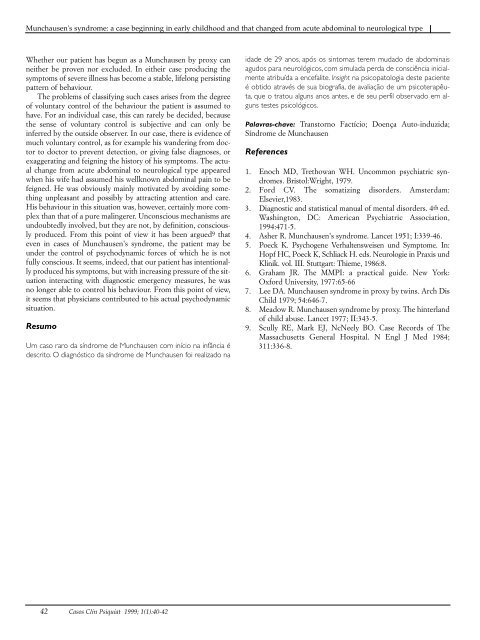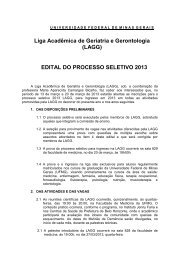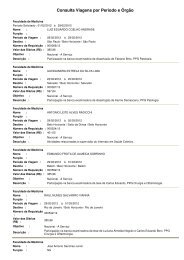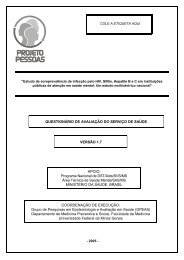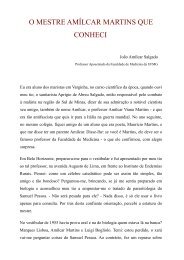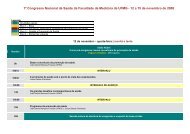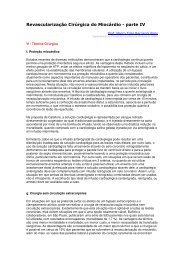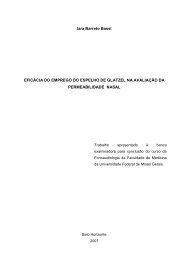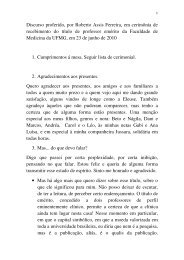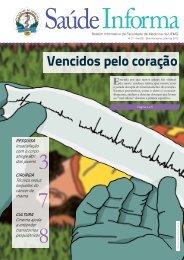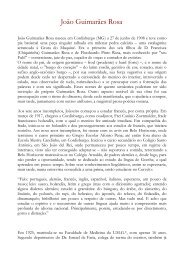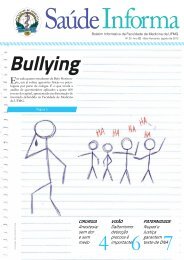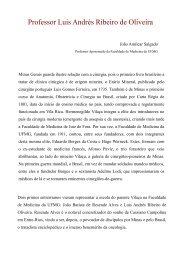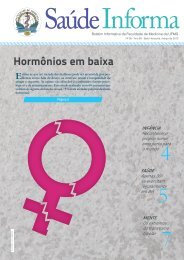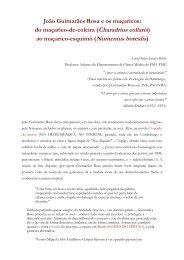Psiquiatria - Faculdade de Medicina - UFMG
Psiquiatria - Faculdade de Medicina - UFMG
Psiquiatria - Faculdade de Medicina - UFMG
You also want an ePaper? Increase the reach of your titles
YUMPU automatically turns print PDFs into web optimized ePapers that Google loves.
Munchausen's syndrome: a case beginning in early childhood and that changed from acute abdominal to neurological type<br />
Whether our patient has begun as a Munchausen by proxy can<br />
neither be proven nor exclu<strong>de</strong>d. In eitheir case producing the<br />
symptoms of severe illness has become a stable, lifelong persisting<br />
pattern of behaviour.<br />
The problems of classifying such cases arises from the <strong>de</strong>gree<br />
of voluntary control of the behaviour the patient is assumed to<br />
have. For an individual case, this can rarely be <strong>de</strong>ci<strong>de</strong>d, because<br />
the sense of voluntary control is subjective and can only be<br />
inferred by the outsi<strong>de</strong> observer. In our case, there is evi<strong>de</strong>nce of<br />
much voluntary control, as for example his wan<strong>de</strong>ring from doctor<br />
to doctor to prevent <strong>de</strong>tection, or giving false diagnoses, or<br />
exaggerating and feigning the history of his symptoms. The actual<br />
change from acute abdominal to neurological type appeared<br />
when his wife had assumed his wellknown abdominal pain to be<br />
feigned. He was obviously mainly motivated by avoiding something<br />
unpleasant and possibly by attracting attention and care.<br />
His behaviour in this situation was, however, certainly more complex<br />
than that of a pure malingerer. Unconscious mechanisms are<br />
undoubtedly involved, but they are not, by <strong>de</strong>finition, consciously<br />
produced. From this point of view it has been argued9 that<br />
even in cases of Munchausen's syndrome, the patient may be<br />
un<strong>de</strong>r the control of psychodynamic forces of which he is not<br />
fully conscious. It seems, in<strong>de</strong>ed, that our patient has intentionally<br />
produced his symptoms, but with increasing pressure of the situation<br />
interacting with diagnostic emergency measures, he was<br />
no longer able to control his behaviour. From this point of view,<br />
it seems that physicians contributed to his actual psychodynamic<br />
situation.<br />
Resumo<br />
Um caso raro da síndrome <strong>de</strong> Munchausen com início na infância é<br />
<strong>de</strong>scrito. O diagnóstico da síndrome <strong>de</strong> Munchausen foi realizado na<br />
42 Casos Clin Psiquiat 1999; 1(1):40-42<br />
ida<strong>de</strong> <strong>de</strong> 29 anos, após os sintomas terem mudado <strong>de</strong> abdominais<br />
agudos para neurológicos, com simulada perda <strong>de</strong> consciência inicialmente<br />
atribuída a encefalite. Insight na psicopatologia <strong>de</strong>ste paciente<br />
é obtido através <strong>de</strong> sua biografia, <strong>de</strong> avaliação <strong>de</strong> um psicoterapêuta,<br />
que o tratou alguns anos antes, e <strong>de</strong> seu perfil observado em alguns<br />
testes psicológicos.<br />
Palavras-chave: Transtorno Factício; Doença Auto-induzida;<br />
Síndrome <strong>de</strong> Munchausen<br />
References<br />
1. Enoch MD, Trethowan WH. Uncommon psychiatric syndromes.<br />
Bristol:Wright, 1979.<br />
2. Ford CV. The somatizing disor<strong>de</strong>rs. Amsterdam:<br />
Elsevier,1983.<br />
3. Diagnostic and statistical manual of mental disor<strong>de</strong>rs. 4th ed.<br />
Washington, DC: American Psychiatric Association,<br />
1994:471-5.<br />
4. Asher R. Munchausen's syndrome. Lancet 1951; I:339-46.<br />
5. Poeck K. Psychogene Verhaltensweisen und Symptome. In:<br />
Hopf HC, Poeck K, Schliack H. eds. Neurologie in Praxis und<br />
Klinik. vol. III. Stuttgart: Thieme, 1986:8.<br />
6. Graham JR. The MMPI: a practical gui<strong>de</strong>. New York:<br />
Oxford University, 1977:65-66<br />
7. Lee DA. Munchausen syndrome in proxy by twins. Arch Dis<br />
Child 1979; 54:646-7.<br />
8. Meadow R. Munchausen syndrome by proxy. The hinterland<br />
of child abuse. Lancet 1977; II:343-5.<br />
9. Scully RE, Mark EJ, NcNeely BO. Case Records of The<br />
Massachusetts General Hospital. N Engl J Med 1984;<br />
311:336-8.


